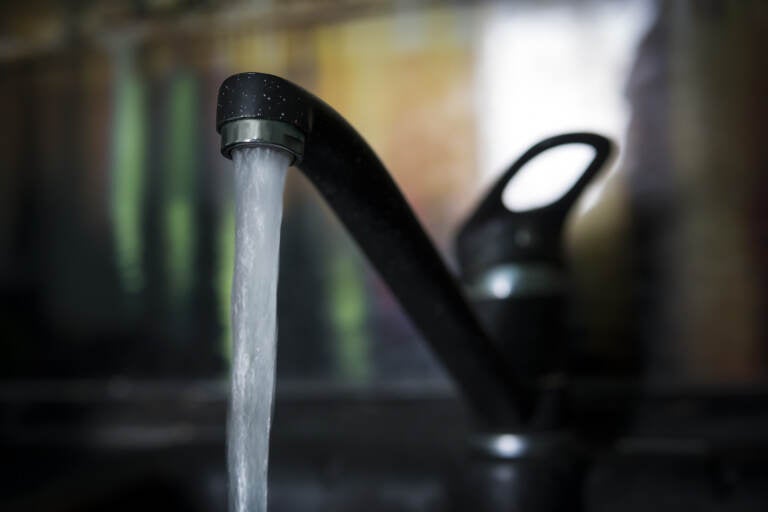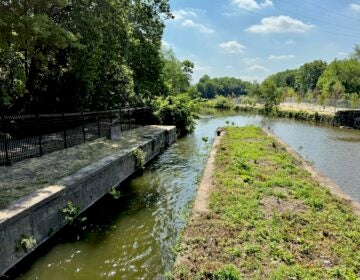Pa., N.J., Del. receive millions of federal dollars for water quality upgrades
The states will use the funding to remove toxic chemicals, remove lead pipes and upgrade sewer and stormwater infrastructure.
Listen 1:08
(BigStock)
From Philly and the Pa. suburbs to South Jersey and Delaware, what would you like WHYY News to cover? Let us know!
Pennsylvania, New Jersey and Delaware are receiving millions of dollars in new funding from the Bipartisan Infrastructure Law to improve drinking water quality, upgrade wastewater treatment, remove lead pipes and protect watersheds.
The federal dollars come as water providers across the nation grapple with new U.S. Environmental Protection Agency requirements to remove toxic chemicals from drinking water, and replace lead service lines over the next decade.
“Water keeps us healthy, sustains vibrant communities and dynamic ecosystems, and supports economic opportunity. When our water infrastructure fails, it threatens people’s health, peace of mind, and the environment,” said EPA Administrator Michael Regan in a statement.
“EPA is working with states and local partners to upgrade infrastructure and address local challenges—from lead in drinking water, to PFAS, to water main breaks, to sewer overflows and climate resilience.”
Pennsylvania will receive more than $132 million, New Jersey was awarded more than $168 million and Delaware will receive almost $21 million.
The funding will be allocated through the Clean Water and Drinking Water State Revolving Funds, which help states provide low-interest loans that finance water infrastructure projects. The Bipartisan Infrastructure Law dollars will prioritize the most at-need communities in the form of grants or loans that don’t have to be repaid.
Funding to help upgrade water systems
Lawmakers in New Jersey said the new funding will help communities improve wastewater and stormwater management, replace lead pipes, and remove toxic chemicals such as PFAS from drinking water.
Under new EPA regulations, water providers must test and treat the toxic class of chemicals known as PFAS to almost zero over the next five years.
The so-called “forever chemicals” have tainted the water, air and soil across the country for decades. The chemicals have been widely used in consumer products such as nonstick cookware, waterproof clothing and some food packaging, as well as in firefighting foam. Almost half of drinking water in the U.S. contains PFAS, according to the U.S. Geological Survey.
The compounds can stay in the environment, and the human bloodstream, for years, and have been linked to serious health problems, including some cancers.
“Clean water is a basic human right, and Americans should not have to think twice about whether lead, PFAS, or any other harmful contaminant is coming out of their tap,” said U.S. Rep. Frank Pallone, D-New Jersey, in a statement following the funding announcement.
The funding will also help communities meet a federal mandate to find and replace lead pipes over the next decade.
Lead pipes can corrode and contaminate drinking water, putting those exposed at risk for serious health problems, including cognitive impairment among children.
The EPA estimates there are more than 9 million lead pipes across the U.S. The Bipartisan Infrastructure Law, approved in 2021, provided $15 billion to help cities replace their lead pipes, but the total cost will be several times higher.
The funding has helped Pennsylvania replace more than 30,000 lead service lines so far, said Pennsylvania Gov. Josh Shapiro in a statement.
Lawmakers in Pennsylvania said the new funding will also help modernize wastewater treatment facilities, improve stormwater management and provide access to clean drinking water.
“The Mid-Atlantic Region is home to some of the oldest water infrastructure in the country, which is why these once-in-a-generation investments are especially significant here,” said EPA Mid-Atlantic Regional Administrator Adam Ortiz in a statement.
The funding comes as communities work to improve wastewater infrastructure to meet federal regulations that require them to reduce 85% of stormwater and sewage overflow.
In older cities such as Philadelphia, sewage and stormwater flows through the same underground pipes. During heavy rainfall, they can overflow — sending raw sewage and pollution from parking lots and streets into waterways.
Migrating fish often struggle to survive and thrive due to low dissolved oxygen levels caused by ammonia discharges from wastewater facilities. The EPA last year proposed water quality standards that aim to protect fish in a portion of the most populated parts of the Delaware River.
Lawmakers in Delaware said the funding will help pay for about 30 water infrastructure projects throughout the state, including upgrades to drinking water and wastewater infrastructure.
“This funding will go a long way to help Delaware communities make the vital upgrades to their wastewater and drinking water systems that they could not afford to make on their own,” said U.S. Sen. Tom Carper, D-Delaware, in a statement. “Having safe and reliable water infrastructure is important to the health of our residents and will attract and retain businesses – ultimately improving the economy of our state.”

Get daily updates from WHYY News!
WHYY is your source for fact-based, in-depth journalism and information. As a nonprofit organization, we rely on financial support from readers like you. Please give today.






